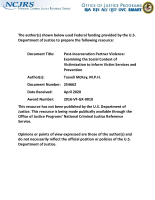Incarceration
Crime and Punishment Reconsidered - Some Comments on Blumstein's Stability of Punishment Hypothesis
Nebraska Department of Correctional Services Incarceration Work Camp Program Statement Final Report
Toward a Demographic Understanding of Incarceration Disparities: Race, Ethnicity, and Age Structure
Post-Incarceration Partner Violence: Examining the Social Context of Victimization To Inform Victim Services and Prevention
Consequences of Incarceration for Gang Membership: A Longitudinal Study of Serious Offenders in Philadelphia and Phoenix
Reentry Discussion: Overcoming Challenges When Leaving Incarceration
State Responses to Mass Incarceration
Researchers have devoted considerable attention to mass incarceration, specifically its magnitude, costs, and collateral consequences. In the face of economic constraints, strategies to reduce correctional populations while maintaining public safety are becoming a fiscal necessity. This panel will present strategies that states have undertaken to reduce incarceration rates while balancing taxpayer costs with ensuring public safety.
See the YouTube Terms of Service and Google Privacy Policy
NIJ Journal Issue No. 242
Less Prison, More Police, Less Crime: How Criminology Can Save the States from Bankruptcy
Professor Lawrence Sherman explains how policing can prevent far more crimes than prison per dollar spent. His analysis of the cost-effectiveness of prison compared to policing suggests that states can cut their total budgets for justice and reduce crime by reallocating their spending on crime: less prison, more police.
See the YouTube Terms of Service and Google Privacy Policy
Going Home (or Not): How Residential Change Might Help the Formerly Incarcerated Stay Out of Prison
Dr. Kirk discusses how Hurricane Katrina affected those formerly incarcerated persons originally from New Orleans and their likelihood of returning to prison. Kirk also discussed potential strategies for fostering residential change among those who were incarcerated, focusing specifically on parole residency policies and the provision of public housing vouchers.
See the YouTube Terms of Service and Google Privacy Policy
Benefit-Cost Analysis for Crime Policy
How do we decide how to allocate criminal justice resources in a way that minimizes the social harms from both crime and policy efforts to control crime? How, for that matter, do we decide how much to spend on the criminal justice system and crime control generally, versus other pressing needs? These questions are at the heart of benefit-cost analysis.
See the YouTube Terms of Service and Google Privacy Policy
Alternative Sentencing Policies for Drug Offenders
The panel presentations from the 2009 NIJ Conference are based on an NIJ-sponsored evaluation of the effectiveness of Kansas Senate Bill 123, which mandates community-based drug abuse treatment for drug possession by nonviolent offenders in lieu of prison.
Discussing the Future of Justice-Involved Young Adults
New science in brain development is transforming young adult involvement with the justice system. On Tuesday, September 8, Attorney General Loretta Lynch, Assistant Attorney General Karol Mason, and experts from NIJ and the Harvard Kennedy School Program in Criminal Justice who serve on the Executive Session on Community Corrections discussed the future of justice-involved young adults.
See the YouTube Terms of Service and Google Privacy Policy
What Works in Probation and Parole
How can we prevent reoffending and reduce costs? Research points to a number of solutions. At the Tuesday plenary, Judge Steven Alm from Hawaii will describe his successes with hard-core drug offenders. “Swift and sure” is his motto. West Virginia Cabinet Secretary James W. Spears will discuss the issues from his state's perspective, and Adam Gelb, Director of the Pew Charitable Trust's Public Safety Performance Project, will lend a national overview.
What Works in Offender Supervision - Panel at the 2009 NIJ Conference
This NIJ Conference Panel highlights findings from NIJ projects that evaluated strategies to enhance the supervision of offenders in the community. Researchers discuss the effectiveness of fair, swift and certain sanctions for high-risk probationers in the Hawaii HOPE program. Panelists also provide empirical evidence on the effectiveness of electronic monitoring — including the use of GPS tracking — for medium- and high-risk offenders on supervision and upon completion of their supervision sentence.


